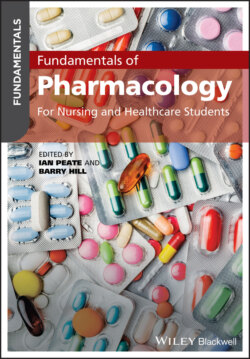Читать книгу Fundamentals of Pharmacology - Группа авторов - Страница 35
Multiple choice questions
Оглавление1 What are the five phases of the nursing process:Assess, diagnose, plan, implement, evaluateAssess, diagnose, predict, implement, evaluateAssess, diagnose, plan, implement, identifyAssess, detect, plan, implement, evaluate
2 Assessment requires the nurse to:Observe the environment, undertake a clinical examination, gather data and communicateConsult the BNF, observe the patient, perform a clinical examination, gather dataObserve the patient, perform a clinical examination, gather data and communicateUse the skills of observation, calculate risk, perform a clinical examination, gather data and communicate
3 The role of the NMC is to:Regulate hospitals or other healthcare settingsRegulate healthcare assistantsRegulate nurses and midwivesRegulate nurses, midwives and pharmacists
4 How many key clauses are there in the NMC's Code:22242523
5 The registered nurse is required to:Act in the patient's best interestsUndertake accurate drug calculations for a variety of medicationsUphold the values of the professionAll of the above
6 What might be the benefits of medications self‐administered by the patient:Staff have more time for other dutiesThe patient gains more controlThere is reduction in the number of medication errorsThere is less risk of infection
7 Medicine management standards provide healthcare workers with:Legal protectionAn ability to opt out of medicines administrationA framework for safe practice in medicines managementThe opportunity to prescribe controlled drugs
8 Oxygen is:Safe to use in any circumstance and does not require a prescriptionA medical gas and has no side effectsA medical gas and as such should be treated as a medicineOnly used in high‐dependency units and never in a patient's home
9 In order to maintain people's safety, staff have to:Have passed an in‐house course concerning competenceHave the appropriate qualifications, competence, skills and experience to maintain people's safetyBe registered with a regulatory bodyBe skilled in CPR
10 Medicines management is different to medicines optimisation as it:Focuses on outcomes and patients rather than process and systemsFocuses on patients and families as opposed to just the patientIs governed by the health or social care regulatorIt only applies in community settings
11 In order to enable a shared decision about treatment:The healthcare provider's values and beliefs are keyPatients' beliefs and preferences about medicines must be understoodThe professional regulator's Code has to be paramountThe patient must sign a consent form
12 The safe use of medicines is the responsibility of:The pharmacistThe patientThe registered practitionerAll of the above
13 The terms ‘non‐compliance’ or ‘non‐adherence’ have been criticised for:Being sexistSuggesting an unequal, paternalistic relationship between health professionals prescribing medication and their patientsSuggesting an equal, relationship between health professionals prescribing medication and their patientsFailing to address the age of the patient
14 A therapeutic relationship is:A helping relationship based on mutual trust and respectA healing relationshipA curative relationship based on the use of medicinesNone of the above
15 The four core governing principles concerning the safe and secure handling of medicines (Royal Pharmaceutical Society) are:Assess, implement, improve, assureEstablish assurance arrangements, ensure capacity and capability, seek assurance, continually improveEstablish insurance, ensure capacity and capability, seek assurance, continually improveEstablish assurance arrangements, ensure asepsis, seek assurance, continually improveEstablish assurance arrangements, ensure capacity and capability, seek validation, continually improve
